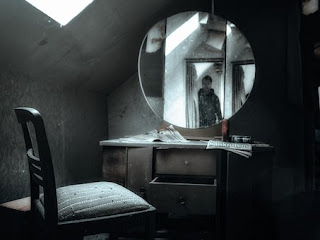Spectral
Faux wool blanket, knitted winter
cap, puffer jacket, oversized hoodie, denim jeans, long underwear, a pair of high-top
sneakers, two pairs of socks, a pair of oven mitts: layers swathing me in merciful
warmth. It was January in Chicago, and this was my protection from
the skin-cracking, blood-freezing, soul-suspending cold.
It
was an abandoned house on the West Side. Dirty needles, spoons blotted with
burn stains, and empty pocket bottles were strewn about. Urine stains and
graffiti decorated the drywall. An empty rat trap lay in a corner. I had taken
a cardboard box
from an alley dumpster and flattened it for a mattress, laid it on the vinyl
floor of the gutted kitchen. There I lay with hands upon my chest, like a
corpse before a ritual burial, as dawn seeped into my textile cocoon.
I had dreamt of college, and images
still lingered in my consciousness. Images not of friends or girlfriends or parties
or classes, but of this homeless man my friends and I called “Moses” for his long
white beard. He would shelter in the public libraries and read, occasionally
rounding to upend chair cushions in search of lost change, diligently putting
them back in their right place. He always wore a black winter jacket, even in
summer, and reeked of cheap cigarettes. The old man never said a word, never
interacted with students, never asked anyone for anything. But he was always
around, like a vagrant ghost.
Something about Moses revealed a trace of
dignity, I realized as I lay on my cardboard. His methods were nonviolent, innocuous,
inoffensive. My life, having devolved into a cycle of blurry highs and nauseating
withdrawals, was devoid of any such self-respect. I guzzled hand sanitizer to get
drunk, sold my body to get high, became a criminal, destroyed friendships,
abandoned my family. Now I had no money, no oxys, no alcohol, no food, no home.
A slave to the cravings, I was subhuman, revering nothing.
Remembering Moses, it seemed I had fallen as
far below him as he was below me before I dropped out of college, when his
presence disgusted and angered me. I never imagined I’d find myself on the
other side of that vast social chasm, neck-deep in a sea of degradation.
I took off the blanket and all the precious
heat built up throughout the night vanished in a breath. The cold was needles
in my fingertips, clamps on the joints. Gusts howled menacingly through broken
windows. When
the wind chill dropped to -30 or -40 (and it always did at some point in winter)
I knew it could be me next. It would only take minutes before the cells in my
fingers and seven remaining toes would freeze and rupture, turn necrotic black.
It reminded me of this guy I knew
who got hypothermia so bad he
started to undress on the street, mumbling to himself and fumbling around. When
spring came his body was found deep under a porch, the rot setting in. He had
burrowed there to die. Maybe
the cold was the universe trying to kill me too, was going to finish the job
that crushed oxys couldn’t do.
Hunger pains encroached, so I
decided to leave and face the suppressing cold. I donned my N95 to shield my
nose and cheeks and replaced my oven mitts with latex dish gloves, then rode my
bike to Little Italy. There was a university there and to the west a medical
center. Maybe surviving like Moses was my way out of the abyss.
David Gershan
David works as a clinical psychologist in Chicago. When not at his day
job, he can be found spending time with his wife and son and indulging in his
love for creative writing. David has published short fiction and poetry in
various literary magazines. He has also written articles for an award-winning
mental health blog.


Thank you for publishing this work.
ReplyDeleteGreat story, David.
ReplyDeleteHey thanks!
Delete